Related Research Articles
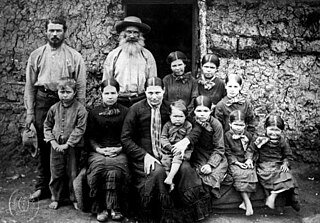
Boers are the descendants of the proto Afrikaans-speaking Free Burghers of the eastern Cape frontier in Southern Africa during the 17th, 18th, and 19th centuries. From 1652 to 1795, the Dutch East India Company controlled Dutch Cape Colony, but the United Kingdom incorporated it into the British Empire in 1806. The name of the group is derived from Trekboer then later "boer", which means "farmer" in Dutch and Afrikaans.
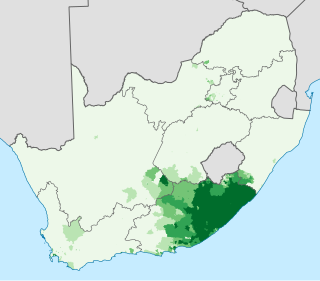
Xhosa, formerly spelled Xosa and also known by its local name isiXhosa, is a Nguni language, indigenous to Southern Africa and one of the official languages of South Africa and Zimbabwe. Xhosa is spoken as a first language by approximately 10 million people and as a second language by another 10 million, mostly in South Africa, particularly in Eastern Cape, Western Cape, Northern Cape and Gauteng, and also in parts of Zimbabwe and Lesotho. It has perhaps the heaviest functional load of click consonants in a Bantu language, with one count finding that 10% of basic vocabulary items contained a click.
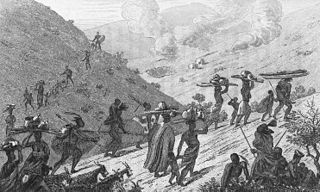
The Mfecane, also known by the Sesotho names Difaqane or Lifaqane, is a historical period of heightened military conflict and migration associated with state formation and expansion in Southern Africa. The exact range of dates that comprise the Mfecane varies between sources. At its broadest, the period lasted from the late eighteenth century to the mid-nineteenth century, but scholars often focus on an intensive period from the 1810s to the 1840s. The concept first emerged in the 1830s and blamed the disruption on the actions of Shaka Zulu, who was alleged to have waged near-genocidal wars that depopulated the land and sparked a chain reaction of violence as fleeing groups sought to conquer new lands. Since the latter half of the 20th century, this interpretation has fallen out of favor among scholars due to a lack of historical evidence.
The Nguni languages are a group of closely related Bantu languages indigenous to southern Africa by the Nguni people. Nguni languages include Xhosa, Hlubi, Zulu, Ndebele, and Swati. The appellation "Nguni" derives from the Nguni cattle type. Ngoni is an older, or a shifted, variant.

At least thirty-five languages are spoken in South Africa, twelve of which are official languages of South Africa: Ndebele, Pedi, Sotho, South African Sign Language, Swazi, Tsonga, Tswana, Venda, Afrikaans, Xhosa, Zulu and English, which is the primary language used in parliamentary and state discourse, though all official languages are equal in legal status. In addition, South African Sign Language was recognised as the twelfth official language of South Africa by the National Assembly on 3 May 2023. Unofficial languages are protected under the Constitution of South Africa, though few are mentioned by any name.

The amaMfengu was a reference of Xhosa clans whose ancestors were refugees that fled from the Mfecane in the early-mid 19th century to seek land and protection from the Xhosa. These refugees were assimilated into the Xhosa nation and were officially recognized by the then king, Hintsa. The term derives from the Xhosa verb "ukumfenguza" which means to wander about seeking service.
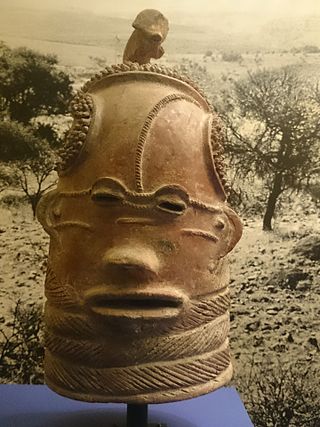
South African Bantu-speaking peoples represent the majority ethno-racial group of South Africans. Occasionally grouped as Bantu, the term itself is derived from the English word "people", common to many of the Bantu languages. The Oxford Dictionary of South African English describes "Bantu", when used in a contemporary usage or racial context as "obsolescent and offensive", because of its strong association with the "white minority rule" with their Apartheid system. However, Bantu is used without pejorative connotations in other parts of Africa and is still used in South Africa as the group term for the language family.

South African literature is the literature of South Africa, which has 11 national languages: Afrikaans, English, Zulu, Xhosa, Sotho, Pedi, Tswana, Venda, Swazi, Tsonga and Ndebele.

African dolls across the continent are created for young girls to play with and as a charm to ensure fertility in women. Their shape and costume vary according to region and custom. Frequently dolls are handed down from mother to daughter. Western dolls are popular in Africa and are often dressed with traditional garb.

The Nguni people are a linguistic cultural group which migrated to South Africa, made up of Bantu ethnic groups from central Africa, with offshoots in neighboring countries in Southern Africa. Swazi people live in both South Africa and Eswatini, while Ndebele people live in both South Africa and Zimbabwe.

The Bhaca people, or amaBhaca, are an Nguni ethnic group in South Africa.
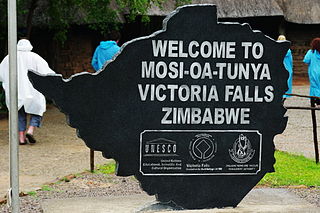
Many languages are spoken, or historically have been spoken, in Zimbabwe. Since the adoption of its 2013 Constitution, Zimbabwe has 16 official languages, namely Chewa, Chibarwe, English, Kalanga, Koisan, Nambya, Ndau, Ndebele, Shangani, Shona, sign language, Sotho, Tonga, Tswana, Venda, Xhosa. The country's main languages are Shona, spoken by only 42% of the population, and Ndebele, spoken by roughly 39%. English is the country's lingua franca, used in government and business and as the main medium of instruction in schools. English is the first language of most white Zimbabweans, and is the second language of a majority of black Zimbabweans. Historically, a minority of white Zimbabweans spoke Afrikaans, Greek, Italian, Polish, and Portuguese, among other languages, while Gujarati and Hindi could be found amongst the country's Indian population. Deaf Zimbabweans commonly use one of several varieties of Zimbabwean Sign Language, with some using American Sign Language. Zimbabwean language data is based on estimates, as Zimbabwe has never conducted a census that enumerated people by language.
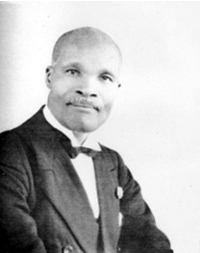
Samuel Edward Krune Mqhayi was a Xhosa dramatist, essayist, critic, novelist, historian, biographer, translator and poet whose works are regarded as instrumental in standardising the grammar of isiXhosa and preserving the language in the 20th century.

The Xhosa people, or Xhosa-speaking people are a Bantu ethnic group native to South Africa. They are the second largest ethnic group in Southern Africa and are native speakers of the IsiXhosa language.
Xhosa may refer to:

This article focuses on the history of 19th century Xhosa language newspapers in South Africa.

Thembuland, Afrikaans: Temboeland, is a natural region in the Eastern Cape province of South Africa. Its territory is the traditional region of the abaThembu, one of the states of the Xhosa nation.

The Cape Qualified Franchise was the system of non-racial franchise that was adhered to in the Cape Colony, and in the Cape Province in the early years of the Union of South Africa. Qualifications for the right to vote at parliamentary elections were applied equally to all men, regardless of race.
Yako may refer to the following people:
St John Page Yako was a Qokolweni-born Xhosa poet and professor of Xhosa literature in the Eastern Cape, South Africa. A translation of one of his poems was published as "The Contraction and Enclosure of the Land" in The Lava of the Land, an anthology of South-African poetry edited by Denis Hirson. "The Contraction and Enclosure" uses imagery from oral poetry to illustrate the consequences of race-based land legislation of South Africa in the 1950s that destroyed the traditional ways of life of many tribes.
References
- ↑ Beningfield, Jennifer (2006). The Frightened Land: Land, Landscape and Politics in South Africa in the Twentieth Century. Routledge. pp. 145–46. ISBN 9781134213535.